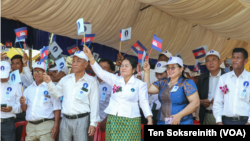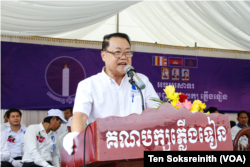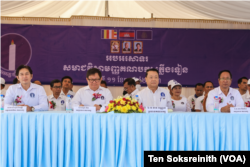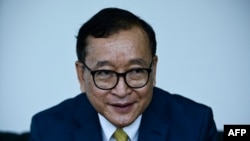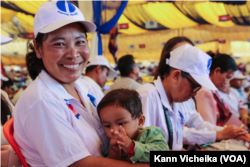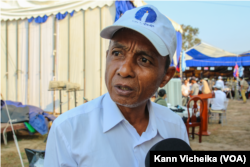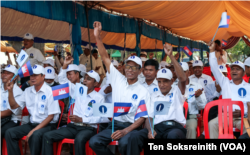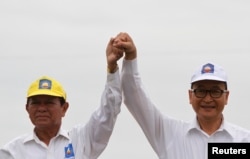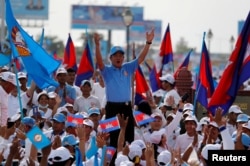SIEM REAP/PHNOM PENH — “Change or no change?” asked the announcer at the first national congress of the Candlelight Party in early February on the outskirts of Siem Reap city in northwest Cambodia.
“Change! Change! Change!” chanted some 7,000 activists and supporters of the party, which represents to most potent challenge the long ruling Cambodian People’s Party, led by Prime Minister Hun Sen, in the upcoming national election in July.
The call-and-response echoed the raucous rallies of the dissolved opposition Cambodia National Rescue Party (CNRP), which garnered immense popularity and success in the 2013 national elections and the 2017 commune elections before it was dismantled by the country’s courts, sending many of its leaders into exile.
But some of its leaders stuck around, despite the continuing crackdown on dissent in Cambodia, and the Candlelight Party is the most prominent among a handful of rekindled opposition groups led by familiar faces.
While the party has borrowed the symbol of the movement started by longtime opposition leader Sam Rainsy — a white candle with an orange flame — he is not officially involved due to his legal baggage, and few expect the party to come anywhere close to the 55 National Assembly seats secured by the opposition CNRP a decade ago.
Yet Hun Sen and his ruling party have proven extremely sensitive to any potential threats as the prime minister of 40 years prepares to transfer power to his eldest son, and the Candlelight Party could secure its place as the main opposition with a few seats in parliament, in which the CPP currently holds all 125 seats.
But the party is aiming for nothing less than victory, Teav Vannol, its president and a former CNRP senator, told the congress, pointing to its success in the 2022 commune elections, when it won 18% of commune councilor posts and 22% of the vote shortly after forming.
“We hope to achieve victory. The Candlelight Party will gain support from voters in 25 provinces. We will win,” Vannol told VOA Khmer after the congress.
Political success is a double-edged sword for the party. The more popular it becomes, the more likely it is to be targeted under new laws that make it easier for the courts to outlaw parties tied to convicted criminals. In January, Candlelight Party Vice President Thach Setha, a longtime opposition figure and leader of the minority Khmer Krom community, was jailed over old allegations of writing fraudulent checks.
This dynamic has left the party walking a tightrope between casting itself as a democratic alternative to the long-ruling CPP without making full-throated attacks on the party, and seeking to gain a foothold through elections that Sam Rainsy and others say will not be free or fair.
It’s not a recipe for success, said Ou Virak, founder of the Future Forum think tank in Phnom Penh, and the brother of the leader of a rival opposition party.
“There is no leadership within the Candlelight Party, nor do they have a solid vision or platform to run them,” he said.
Among the party’s biggest liabilities is its historic association with Sam Rainsy, who at 74 years old remains the face of Cambodia’s democratic opposition. In October, Hun Sen threatened to dissolve the party if it maintained any connection with Sam Rainsy — forcing the party’s leaders to deny any ongoing connection.
“The ruling party understands that by doing that, the Candlelight Party will be weakened, in terms of popularity, but also in terms of garnering support, as well as financial support from abroad, which is actually a very crucial part of any political party: Its financing,” said Ou Virak.
Grassroots ‘Silent’ Support
Sorn Phearum cheered as the party’s leaders spoke in Siem Reap, while cradling her 18-month-old son on her lap.
“I have 100% confidence,” said the 37-year-old member of the party’s women’s movement in Pursat province. Sorn Phearum told VOA Khmer that people like her, who have experienced unfair treatment from local authorities, are driven by the party’s commitment to social justice and equitable opportunity.
“People in my community hope to see more jobs, justice, and truth, despite facing constant intimidation and discrimination because we support an [opposition] party,” said Sorn Phearum.
Korng Det, a vice-president of the Candlelight Party’s operation unit in Prey Veng province’s Pea Reang district, said the party’s drive for victory is “growing strong” at the local level. An opposition supporter since 1995, he said he is undeterred by the ruling party’s increasing harassments towards his group, and that committed to helping his party win in July.
“I am not afraid, even of death. We’ve lost trust and confidence and hope in [the government]. We only have the Candlelight Party, which gives us hope to strive,” Korng Det told VOA Khmer.
The harassment of Candlelight leaders and activists extends well beyond Thach Setha, who was jailed in March and denied bail for allegedly signing on a bad check in 2019. A week before that, three of the party’s members were sentenced to two years in prison on forgery charges linked to the creation of another political party in 2021.
In February, Son Chhay, another of the party’s five vice presidents, was found guilty of defaming Hun Sen’s ruling CPP and the National Election Committee (NEC) for alleging fraud in the commune elections last year, and ordered to pay roughly $1 million in compensation.
Yet the party has pressed ahead with its work, with leaders traveling abroad to fundraise, meeting with grassroots activists and organizing a public event calling for justice for the victims of the 1997 grenade attacks on an opposition rally in Phnom Penh.
“We will participate in the elections, unless the situations are worsened by the election day where we can’t voice any concerns or complaints,” said Son Chhay, adding that the party wanted to begin a new political era, “where politicians don’t see each other as enemies.”
Ly Kimheang, a Candlelight commune council in Kampong Cham province, said she has been working every weekend since the party congress, “meeting with other activists and party members at the district level to implement plans to help the party prepare for the July election.”
“There are these silent voters who will come out and vote for us. If you ask them publicly, they won’t say so. Why? Because they are afraid of intimidation by local authorities. They asked me not to show up at their house but said that they will vote [for the party],” she said.
An Opposition Divided
The Candlelight Party isn’t alone in seeking out a lane as a viable — but not too threatening — opposition to Hun Sen’s government.
Kem Sokha, a longtime opposition figure who was Sam Rainsy’s deputy president in the 2013 election, was convicted of treason and sentenced to 27 years of house arrest in a case blasted by western governments and rights groups.
Some of his allies within the now-defunct CNRP have started their own party, the Cambodia Reform Party, which has borrowed the rising sun logo from its predecessor party. It is taking a cautious approach to the upcoming elections.
“We’re watching everything carefully and strategically. Nothing is set in stone in our politics. We are not saying we won’t participate in this July elections, nor are we saying we don’t look for an opportunity to merge with other parties,” said Pol Ham, its president.
The merger of several opposition parties in the final months before the election could build momentum and help counter the ruling party’s aggressive tactics in consolidating power, said long-time political observer Ok Serei Sopheak.
“After a harsh sentencing of Kem Sokha, while Sam Rainy remains in self-exile, I think the non-aligned government political parties have no other choices than to work together, either as one party or as strategic partners in dividing support for each political party at certain polling stations,” he told VOA Khmer.
But there are few signs of unity within the fragmented opposition.
“Remember, Kem Sokha did not endorse the Candlelight Party, in fact, he came out critically of the Candlelight Party,” said Ou Virak. He added that Kem Sokha’s efforts to “hold onto” the Cambodia National Rescue Party “indicate that there’s actually very clear division among the opposition.”
It’s a dynamic that the ruling party is surely well aware of, said Sebastian Strangio, the author of “Hun Sen’s Cambodia.”
“We have to ask why Candlelight Party has been able to register and run in the upcoming election. I mean this is not something that CPP had to do. It was a choice that the party made very likely with strategic goal in mind,” he said.
It has the added benefit of showing western countries, who strongly condemned Kem Sokha’s verdict and have called for a free and fair election, “a more democratic, legitimate electoral process that will result in a lessening of western pressure against the Cambodian government,” Strangio added. “But I think the primary reason is to offer the Cambodian public a sense of a bit more choice.”
‘No Surprises’
Later this month, the National Election Committee will begin registering political parties and their candidates for post-war Cambodia’s seventh national election, set for July 23.
Sam Rainsy is busy mobilizing international pressures against the Hun Sen’s government, arguing Kem Sokha’s verdict was a precursor to a bogus election.
“Kem Sokha is convicted and detained and cut off from even meeting with his lawyers. The CNRP is banned. So, the ‘election’ is a fake exercise at present,” said Sam Rainy, in an email to VOA Khmer.
“For any opposition party to be able to accept election result, there would have to be an environment for a free and fair election, which needs to be put in place well before polling day,” he added, urging fundamental reforms to the CPP-controlled National Election Committee.
Ear Sophal, a senior associate dean and an associate professor in the Thunderbird School of Global Management at Arizona State University, said one certainty is that the CPP will make sure it wins.
“No surprises will be entertained and the only viable opposition party, the Candlelight Party, will be snuffed out just like its namesake but the ruling Cambodian People’s Party,” he added.
Astrid Norén-Nilsson, an associate senior lecturer at the Center for East and Southeast Asian Studies, at Lund University in Sweden, isn’t so sure.
“The main unknown at this point in time is whether the Candlelight Party will face party dissolution or will be able to compete in the elections,” she said. “Neither situation would raise eyebrows.”




